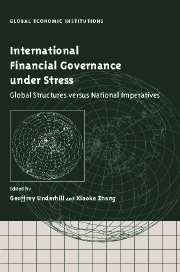Book contents
- Frontmatter
- Contents
- List of figures
- List of tables
- List of contributors
- Acknowledgements
- Introduction: global market integration, financial crises and policy imperatives
- I Financial globalisation and policy responses: concepts and arguments
- II Globalisation, financial crises and national experiences
- III Private interests, private–public interactions and financial policy
- IV Building the new financial architecture: norms, institutions and governance
- 15 The legitimacy of international organisations and the future of global governance
- 16 The G-7 and architecture debates: norms, authority and global financial governance
- 17 Bail-outs, bail-ins, and bankruptcy: evolution of the new architecture
- Conclusion: towards the good governance of the international financial system
- Index
15 - The legitimacy of international organisations and the future of global governance
Published online by Cambridge University Press: 22 September 2009
- Frontmatter
- Contents
- List of figures
- List of tables
- List of contributors
- Acknowledgements
- Introduction: global market integration, financial crises and policy imperatives
- I Financial globalisation and policy responses: concepts and arguments
- II Globalisation, financial crises and national experiences
- III Private interests, private–public interactions and financial policy
- IV Building the new financial architecture: norms, institutions and governance
- 15 The legitimacy of international organisations and the future of global governance
- 16 The G-7 and architecture debates: norms, authority and global financial governance
- 17 Bail-outs, bail-ins, and bankruptcy: evolution of the new architecture
- Conclusion: towards the good governance of the international financial system
- Index
Summary
One way to examine global governance – that is, its present and future situation – is to analyse international organisations (IOs). Given their important position and mandate in the international arena, they provide a convenient entry point of analysis. However, their number, variety of purposes and contradictions provide strong evidence against a vision of international socialisation seen as a natural and smooth process of progressive integration of states into a peaceful international society under the guidance of universal values and rules. The tension between goals, charts, intentions and realpolitik, far from being an object of naive lamentation or hypocritical contempt, is precisely the interesting empirical material with which one can study the components of their legitimacy. The main purpose of this chapter is to examine the legitimacy of international organisations where this tension plays a visible and important role. The examination will not only provide a good indication of their standing and evolution but also allow us to take stock of the present situation and explore the future of the international system and global governance.
This chapter contends that the legitimacy of IOs stems from an awareness and an acceptance of the need of mechanisms and institutions of global regulation for the common good. In turn, this awareness feeds a political rhetoric and a system of ethical values which are then ‘operationalised’ by the political ruling elites in nation states.
- Type
- Chapter
- Information
- International Financial Governance under StressGlobal Structures versus National Imperatives, pp. 305 - 323Publisher: Cambridge University PressPrint publication year: 2003



